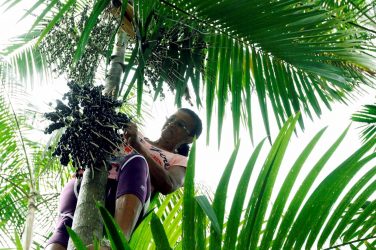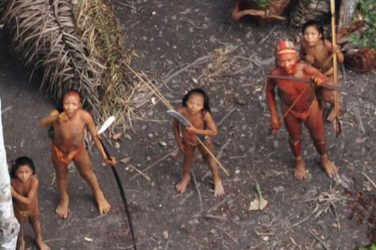 We need to talk about the mental health of the Guarani-Kaiowá people in Brazil. World Mental Health day should be a time to look forward and seek improvements for people suffering from mental illness.
We need to talk about the mental health of the Guarani-Kaiowá people in Brazil. World Mental Health day should be a time to look forward and seek improvements for people suffering from mental illness.
And taking action becomes even more urgent once you learn that every six days, a Guarani person commits suicide.
The Guarani peoples are one of Brazil’s most ancient tribes who were there when the first Europeans arrived. It’s estimated they once numbered half a million but today they number around 51,000.
Last week I met Elizeu Lopes, a Guarani-Kaiowá leader from the state of Mato Grosso do Sul. What he shared with us shocked me: over the last ten years, suicide has been one of the Guarani’s biggest killers, with children as young as nine taking their own life. This makes the Guarani’s suicide rate the highest in the world.

“We live under systematic constant massacres,” Elizeu Lopes
Very often, the reasons for someone tragically taking their own life are opaque and loved ones struggle to understand. I can’t help but think that with the Guarani, the reasons are far clearer.
Elizeu told us how every twelve days, one of their community is killed – by paramilitaries, security personnel working for large agricultural business or even by one of their own community. Members of their community have been beaten to death, shot and poisoned.
Brutal action is taken against them seemingly as punishment – three days after the UN Special Rapporteur for Indigenous Peoples visited Elizeu’s village to look into their situation, their houses were burnt to the ground.
“We Have No Space”
It’s not just the murders that are killing them. For decades, they have been fighting agribusinesses over access to their ancestral lands. Native people’s relationship with their ancestral land is spiritual, it is steeped in tradition and key to their identity – without it they lose a vital part who they are.
Land is not only key to identity but is also key to providing food. The lack of space and recognition from the Brazilian government mean malnutrition, poor health, hunger and a lack of access to basic services also plagues the Guarani.
The land Elizeu and his people once had accounted for around ten percent of Mato Grosso do Sul state. Now, many of them are squashed into small reserves or, even worse, onto roadsides. For example, the Dourados reserve, roughly 12 miles squared houses over 12,000 Guarani.
I can’t imagine what living in constant fear, being discriminated against, watching your loved ones killed and having little access to basic needs does to your mental mind-set. These cramped, stressful conditions and the loss of spiritual identity help explain how intra-community violence can occur.
Elizeu told us, “we struggle for land because we need space… we don’t have anywhere to live.” They are frustrated with the Brazilian government’s failure to deliver. Lands which should have been given to them, have not been handed over, so some are trying to “retake” their land, putting them at direct risk of landowners’ revenge.
“We are demanding this 0.2% of the land. The government are not doing that; this is why we are retaking it. We will keep doing it until they demarcate our lands. We want a solution. We don’t know what it is but it’s urgent. We are the ones who are dying and we need help,” said Elizeu
We need to support the Guarani-Kaiowá in their fight. They are up against some of the most financially and politically powerful in Brazil. Local courts have decided cases in favor of ranchers and evicted them from lands. The law is used against them time and time again.
A new scheme, called PEC 215, that could give landowners the chance to stop indigenous territories being recognized and break up those that already have, is being debated by Brazilian Congress.
We must speak now to urge Congress not to approve this scheme. Amnesty will be working on more actions over the coming months, but, for now, support Elizeu and his community by taking Survival International’s action.
Ellie May is Amnesty International UK’s Country Coordinator for Brazil.



